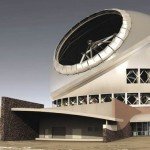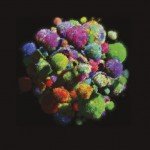The Greatest Genius in History
The history of science and technology is rich with great minds, but who is the greatest?
Johannes Kepler (1571-1630)
What Kepler achieved was extraordinary. He was the person who made sense of astronomy. He realised, following in the footsteps of Copernicus, that the Sun is not the dead centre of the Universe and that the planets go round in ellipses. He was a wonderful, weird character: incredibly shortsighted and yet he gazed at the stars. He would get into fierce debates with Galileo about tides and why they happen. Kepler quite correctly said that it’s because of the Moon – he basically predicted gravity.
Kepler was very stubborn too. He worked for Tycho Brahe for a while, who had been studying all this data about the Solar System but wouldn’t let Kepler lay his hands on it. One of the stories goes that Kepler poisoned him – certainly Brahe died under mysterious circumstances. Either way Kepler managed to nick all his data, and use it for his own purposes.
He spent 16 years just creating model after model after model, until finally he got into ellipses. For too long, circles obsessed him: circles were perfect, circles were what his hero Copernicus had championed. It turned out circles were wrong and it was the data that swung it. What stands out was Kepler’s willingness to just grind away at the mathematics. One of the most important things about genius is persistence.
Rosalind Franklin (1920-1958)
Rosalind Franklin systematically, methodically, and meticulously spent many years encoding or deciphering the structure of DNA using X-rays. It was her pictures, her X-rays, that made Watson and Crick absolutely certain about the structure of DNA. They were close but they needed the evidence. They were theoreticians, but her work was the real data that solidified what they had been getting to.
Unfortunately she died of ovarian cancer at a young age and the Nobel Prize is not given posthumously, so we’ll never know whether she would have been recognised. She was working in very maledominated conditions back in the ’40s and ’50s. The question of genius is an interesting one.
Some people argue that genius is a leap of creative thought, where you take a few disparate pieces of information, put them together and leap further than anyone else would. I’d argue there’s another side, which is the more methodical, precise, and meticulous route that’s equally vital.
The point is, even though she wasn’t the first to say it, the general consensus is that in her mind she knew what the structure of DNA was before anyone else, but she wasn’t prepared to go out there on a limb without knowing the evidence for sure. Perhaps that’s something women suffer from even now: a lack of confidence in their own convictions and their own findings. Perhaps if she did, she might have aired her views earlier.
Aryabhatta (476-550)
For me, Aryabhatta, the famous Indian mathematician and astronomer who wrote his first monumental classic on mathematics, Aryabhatiyam, incorporating among other complex subjects, spherical trigonometry, quadratic equations, and sine tables at an age of 23 years. His explanations of sine tables (sine, cosine, versine and inverse sine) are considered the forerunner of modern trigonometry.
He was correct up to 4 places of decimals in assigning values to sine and versine from 00 to 900 . In times when computing systems were not evolved, he could comprehend the value of π, again correct up to 4 decimal places and the circumference of earth to 99.80% accuracy. Many mathematicians give credit of knowledge of zero to Aryabhatta as it is considered implicit in his place value system as a placeholder for powers of ten. He also hypothesised, contrary to existing views then that the earth rotates on its axis daily and that solar and lunar eclipses were caused by shadows cast by sun and moon on the earth.
He calculated positions of the planets in terms of distance from the earth and calculated the sidereal rotational value of earth correct up to seconds (23:56:4.1 as against modern value of 23:56:4.091). His calculation of the length of the sidereal year was correct up to 3 min and 20 seconds over a length of full one year. Such accuracy and insight, independent of time and space, can only come from a real genius.
Bernhard Riemann (1826-1866)
Riemann discovered several branches of mathematics that have had a massive impact since the middle of the 19th Century. He pioneered what’s called ‘high-dimensional geometry’, which was absolutely key to Einstein’s breakthrough on relativity.
He understood how you can go from three dimensions to four to five to 11. That insight is absolutely extraordinary – using a mathematical language to go from the physical world around us to geometries in higher dimensions. It’s crucial for physics and, without it, Einstein wouldn’t have had the maths to develop his ideas. Another of his great breakthroughs was concerning prime numbers – numbers that can only be divided by one and themselves. These are like atoms for a mathematician, and he discovered their ‘DNA’, which basically tells us how they are distributed. You might think prime numbers are rather esoteric, but they’re at the heart of internet cryptography – they help us make unbreakable codes.
Understanding these numbers has had a massive impact on the digital world. Riemann created a new way of being able to talk about geometry and numbers. His staggering breadth of work and originality is what marks him out as a genius for me.
Leonardo da Vinci (1452-1519)
Da vinci was a mathematician, engineer, botanist, cartographer, and much more, so it’s hard to single out one achievement. He was remarkable really. This is a guy who had no formal schooling. His trade was a painter and he learnt what he did through deduction. Da Vinci’s studies in anatomy started with his desire to create realistic figures and therefore wanting to know how the body was constructed. A lot of what he discovered in that process is consistent with what we know today.
When I look at his drawings they could easily have been lifted from text books that I regularly refer to. This was in the 1400s, so I think to dismiss him as an artist who just dabbled in science would be a misstatement. He tells us a lot about what it means to be a scientist. The idea that we have both artists and scientists is actually a fairly recent one. It’s only in the last couple of hundred years that we’ve made the distinction. Kids in school effectively have to chose between doing arts and science subjects and cast themselves as one or the other, when actually doing science well is a deeply creative endeavour, one that requires you to observe and document the world in the same way that a good artist would.
I nominate him as my favourite genius not just because he excels in so many different spheres, but because he shows us what science is really all about.
Charles Darwin (1809-1882)
I nominate Charles Darwin because he changed the way we think about life on Earth and our place in it. He is one of the most influential thinkers of all time. Not only did his idea of evolution by natural selection revolutionise the field of biology, but it has also influenced our views of society, ethics and religion. At the time it created huge controversy and Darwin knew this would be the case. He stated to his friend the botanist Joseph Hooker (in 1844) that his idea that species were not immutable, but evolved, was ‘like confessing to a murder’.
What I admire about Darwin is not just his insight, but also the very detailed and careful way in which he worked. He assembled a huge amount of evidence to support his ideas. He was a superb observer and carried out extremely meticulous and painstaking experiments. Most people have heard of On The Origin Of Species, but Darwin was a prolific scientist and published many other wonderful works. He explained how coral atolls are formed, published a huge tome on barnacles and wrote on the expression of emotions in man and animals, and on carnivorous plants. My particular favourite is his book – his little treatise he calls it – on British orchids, Fertilisation Of Orchids.
Albert Einstein (1879-1955)
For me it was close between Einstein and Newton, but in Newton’s time there weren’t that many people doing science. However, at the start of the 20th Century, when Einstein was working, there were lots of other great scientists such as Paul Dirac, Werner Heisenberg, Niels Bohr and several others. Even amongst them Einstein was considered special. S
ome people may say this is a lazy choice but I have thought long and hard about it and I feel it’s right. The three theories that he published in four papers are some of the greatest ideas ever to come out of the human mind: he proved that atoms exist with his paper on Brownian motion, discovered the fact that light is made up of packets of energy, and the whole field of cosmology and most of modern astronomy was born from the General Theory of Relativity. Any one of those would have been enough to put him up there as one of the greats.
He changed forever the way we understand our Universe. Even now, when we talk about the possibility of a big idea changing science we say ‘we need another Einstein’.
James Lovelock (1919 – )
Back in the 1950s, James Lovelock invented the ‘electron capture detector’ – an incredibly sensitive piece of equipment that proved very useful in the analysis of the chemicals responsible for destroying the ozone layer. If he’d done just that, he’d be a major experimental scientist. But Lovelock is most famous for his Gaia hypothesis: the idea that organisms and the planet they’re on interact to keep it suitable for life. Organisms don’t just adapt in a Darwinian way to whatever environment they’re put into – they can actually shape the environment too.
This idea was initially attacked, and there are still problems, but the idea that organisms and planets interact like this is being taken seriously now, and is stimulating a lot of important research. What I love about Lovelock is the variety of his work and the fact he’s totally independent, being funded by the money from his inventions. As a result, he’s free to say what he likes – and isn’t afraid to change his views. People talk a lot about Stephen Hawking and Peter Higgs.
They’re really smart guys, but what they’ve discovered isn’t going to change our lives in any direct way. Lovelock’s work is both universal and relevant to all our lives through its implications for the environment. For me, that makes him our greatest living scientist.
Marie Sklodowska Curie (1867-1934)
There are only four people who have won two Nobel Prizes and Marie Curie was the first of them. She won a Nobel Prize in physics in 1903 for her work on radiation, and then one in chemistry in 1911 for the discovery of the elements radium and polonium. She did a lot of groundbreaking research looking into radiation and into the fundamental nature of atoms. During the early 19th Century, our knowledge of the atom was relatively limited. Her work was really probing into exactly what matter consists of and getting a better understanding of the elements, and of the atom itself. And she made all of her breakthroughs by slogging away in a lab.
I think her genius can be seen not only in her experiments and the physical doing of things, but also in her choices of exactly what to study. She had an amazing insight to see where new science might be. It’s also worth nothing that there weren’t many women doing science at that time and I think the fact that she was doing work of such a high standard as a woman in that era is impressive in itself.



































